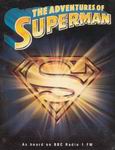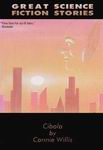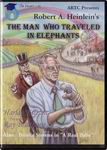
 Hollywood Fantasies – Ten Surreal Visions of Tinsel Town
Hollywood Fantasies – Ten Surreal Visions of Tinsel Town
By Robert Bloch, Harlan Ellison, Ed Gorman, John Jakes, David Morrell, Michael Reaves, David Schow, Robert Sheckley, Robert Silverberg and Henry Slesar; Read by Susan Anspach, David Birney, Harlan Ellison, Jamie Farr, Laini Kazan, Steve Kmetko, Harley Jane Kozak, Favid Madden and John Rubinstein
4 cassettes – Approx 6 Hours [UNABRIDGED]
Publisher: Dove Audio
Published: 1997 – hardcopy out of print (available for download at Audible)
ISBN: 0787109460
Themes: Fantasy / Hollywood / Movies / Television / Westerns / Witchcraft / Virtual Reality / Magic /
Learn the truth behind the mask of Hollywood in these ten bizarre tales of dreams and dream weavers, movies and movie-makers, by some of the most respected fantasy writers of our time.
This disappointing collection has a few redeeming tales, but few must-listen gems. The majority of the stories feel like filler – many feature tacked on twist endings that are less than stellar. Apparently Harlan Ellison’s reading of his own story, “Laugh Track,” has been modified in the performance – with the addition of a few lines here and there – if anybody’s gonna mess with a story it best be the author. The cover art is utilitarian but colorful, packaging for this audiobook is however very poor, most examples of these 4 cassette plastic cases with cardboard covers have become unbound as the glue holding the two together was not up to its task. Another minor annoyance, the mislabeling of cassette 4, Ed Gorman’s story “Gunslinger” is said to run through all of side 7 and onto 8, when it is the reverse. “Dead Image” starts on side 7 and runs through all of side 8.
Stories Included:
“The Never-Ending Western Movie” by Robert Sheckley
Jamie Farr’s gruff cowboy voice successfully narrates this 1976 short story, which posits an alternate world in which the old-fashioned movie serial westerns and reality television have merged. This is hard enough on the actors, who now have to do their own stunts, but when the prop guns fire real bullets acting scared isn’t too tough.
“One For The Horrors” by David Schow
A run-down movie theater shows prints of lost movie masterpieces like The Man Who Would Be King starring Humphrey Bogart and Clark Gable? The only thing that could top that is what’s playing tomorrow night! This one really is fantasy! Strictly for film connoisseurs – it held my interest but could have exited the stage a little more interestingly. Author David Schow must have done some fascinatingly fun research for this one. Reader Steve Kmetko works some magic of his own in the theater of the ear.
“The Man Who Wanted To Be In The Movies” by John Jakes
George wants to be in movies, so he visits his local licensed witch to cast a spell that’ll do the job. Harley Jane Kozak, the narrator, is fine – but the story itself is absolutely pointless and uninteresting.
“Laugh Track” by Harlan Ellison
Have you ever wondered where the laugh tracks from television sitcoms come from? Meet Wally Modisett, the Phantom Sweetener. Originally appearing in “Weird Tales” Magazine in 1984, this overly lengthy tale is almost made up for in part by Ellison’s enthusiastic performance, told in first person.
“Reality Unlimited’ by Robert Silverberg
Virtual Reality movies. Neat idea, but that’s all it is, the idea is there but the story is M.I.A.. When this tale was written in 1957 it might have had some point to it, today it’s barely a curiosity. A disappointing story by the usually reliable Silverberg. But on the other hand Susan Anspach reading of it was fine.
“The Movie People” by Robert Bloch
Movie extras have been in Hollywood films since the silent era, but just because they have no lines doesn’t mean we can’t read between them. Adequate and with a modicum of originality this tale would have benefited from a few more drafts before publication – it wanted to be a better story. John Rubenstein takes his time with the telling – a laconic voice that doesn’t detract from the story.
“Werewind” by Michael Reaves
A serial killer and a lonely howling wind may be connected. The only question is how. Marginally listenable, Michael Reaves’ story isn’t predictable, but neither is it comprehensible. It feels like a refugee from a Danielle Steele novelization of A Nightmare on Elm Street – and that doesn’t make any sense to me either! David Madden’s reading is far better than this short deserves.
“The Movie Makers” by Henry Slesar
Henry Slesar’s ode to 1950’s science fiction b-movies succeeds – in disappointing the same way those bad movies do – minus the cheesy special visual effect. The twist ending is also predictable. Lainie Kazan’s serviceable reading is adequate to the story’s requirements – though consider the predominant male characterization a female narrator is a questionable choice.
“Gunslinger” by Ed Gorman
In the early Twentieth century cowboys were heading away from the range and towards Hollywood, where they’d take on roles in the burgeoning western film frenzy. One man however is has a score to settle with one of these cowboys turned film actors, and its gonna be real bullets that’ll fly. “Gunslinger is illogically placed in this collection – it is not fantasy. It is set in Hollywood, but isn’t particularly fanciful. David Birney doesn’t have much to do here, but neither does he fail to achieve what’s required – to tell the story.
“Dead Image” by David Morrell
A thinly veiled tale about movie rebel James Dean, that asks the question: If Dean had a second chance at life would he do things any different? This very interesting tale depends upon a listener’s knowledge of James Dean’s life and death – also neat was the appearance of a Dennis Hopper type. Morrell’s tale isn’t likely to be turned into a film itself, but it’s full of neat ruminations on destiny and fame. Jamie Farr’s deep voice makes a second, and very welcome, appearance in this collection. He’s becoming one of my favorite celebrity narrators.
Posted by Jesse Willis

 The Adventures of Superman
The Adventures of Superman




